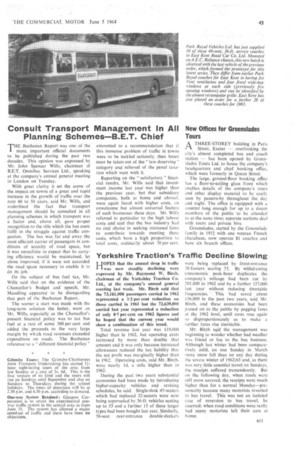Yorkshire Traction's Traffic Decline Slowing
Page 45

If you've noticed an error in this article please click here to report it so we can fix it.
H0PES that the annual drop in traffic was now steadily declining were expressed by Mr. Raymond W. Birch, chairman of the Yorkshire Traction Co. Ltd., at the company's annual general meeting last week. Mr. Birch said that the 73,161,000 passengers carried in 1962 represented a 1-2 per cent reduction on those carried in 1961 but the 72,639,000 carried last year represented a reduction of only 0-7 per cent on 1962 figures and he hoped that the current year would show a continuation of this trend.
Total revenue last year was £19,000 higher than in 1962, but operating costs increased by more than doublethat amount and it was only because increased allowances reduced the tax liability that the net profit was marginally higher than in 1962. Operating costs, said Mr. Birch, were nearly ld, a mile higher than in 1962.
During the past two years substantial economies had been made by introducing higher-capacity vehicles and revising schedules, he said. Single-deck 45-seaters which had replaced 32-seaters were now being superseded by 36-ft. vehicles seating up to 53 and a further 15 of these larger types had been bought last year, Similarly, 56-seat rear-entrance double-deckers were being replaced by front-entrance 30-footers seating 73, By withdrawing uneconomic peak-hour duplicates the company's, mileage had been cut by 201,000 in 1962 and by a further 157,000 last year without reducing timetable frequencies. This had saved about t36,000 in the Past two years, said Mr. Birch, and these economies had been passed on to the public by pegging fares at the 1962 level, until costs rose again so disproportionately as to make a further fares rise inevitable.
Mr. Birch s4jd the management was beginning to wonder whether bad weather was friend or foe to the bus business. Although last winter had been coniparatively mild, on one Sunday in March more snow fell than on any day during the severe winter of 1962163 and, as there was very little essential travel, on Sundays, the receipts suffered tremendously. But on the following day, when roads were still snow covered, the receipts were much higher than for a normal Monday—presumably because many motorists reverted to bus travel. This was not an isolated case of reversion to bus travel, he asserted; when road conditions were really bad many motorists left their cars at home.












































































































































































